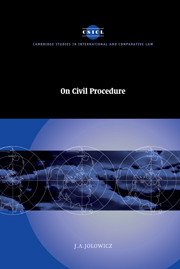Book contents
- Frontmatter
- Contents
- Preface
- List of abbreviations
- Introduction
- I The litigation process
- II Protection of diffuse, fragmented and collective interests
- III Procedural modes
- IV The parties and the judge
- 10 Da mihi factum dabo tibijus: a problem of demarcation in English and French law
- 11 Fact-finding
- 12 The expert, the witness and the judge in civil litigation: French and English law
- 13 The use by the judge of his own knowledge (of fact or law or both) in the formation of his decision
- V Recourse against judgments
- VI Procedural reform
- Index
- CAMBRIDGE STUIDES IN INTERNATIONAL AND COMPARATIVE LAW
10 - Da mihi factum dabo tibijus: a problem of demarcation in English and French law
from IV - The parties and the judge
Published online by Cambridge University Press: 18 December 2009
- Frontmatter
- Contents
- Preface
- List of abbreviations
- Introduction
- I The litigation process
- II Protection of diffuse, fragmented and collective interests
- III Procedural modes
- IV The parties and the judge
- 10 Da mihi factum dabo tibijus: a problem of demarcation in English and French law
- 11 Fact-finding
- 12 The expert, the witness and the judge in civil litigation: French and English law
- 13 The use by the judge of his own knowledge (of fact or law or both) in the formation of his decision
- V Recourse against judgments
- VI Procedural reform
- Index
- CAMBRIDGE STUIDES IN INTERNATIONAL AND COMPARATIVE LAW
Summary
Acts performed in the ‘real’ world affect people in their ‘real’ lives, and it is one of the functions of the law to specify when and under what conditions one person is entitled to have another do or refrain from doing something in that world. In complex modern societies it is not, of course, always possible to describe the real world without recourse to the law and legal concepts, and this is most obviously the case when one person invokes the assistance of the legal process in the pursuit of his demand that another person, or the State itself, confer upon him some advantage. It would, for example, be difficult for an author to demand monetary compensation from the publisher of a pirated version of his book without reference to the legal concept of copyright, and it is impossible to reify divorce without reference to the legal structure of society: at the secular level neither marriage, which is different from cohabitation, nor divorce, the principal characteristic of which is conferment of the right to remarry, is comprehensible unless seen against the background of the law. Nevertheless, it has to be recognised that civil litigation takes place when one person demands some advantage for himself - usually, but not always, at the expense of another - and that advantage proves in the event to be one that he cannot obtain without the intervention of the court.
- Type
- Chapter
- Information
- On Civil Procedure , pp. 185 - 204Publisher: Cambridge University PressPrint publication year: 2000
- 1
- Cited by



